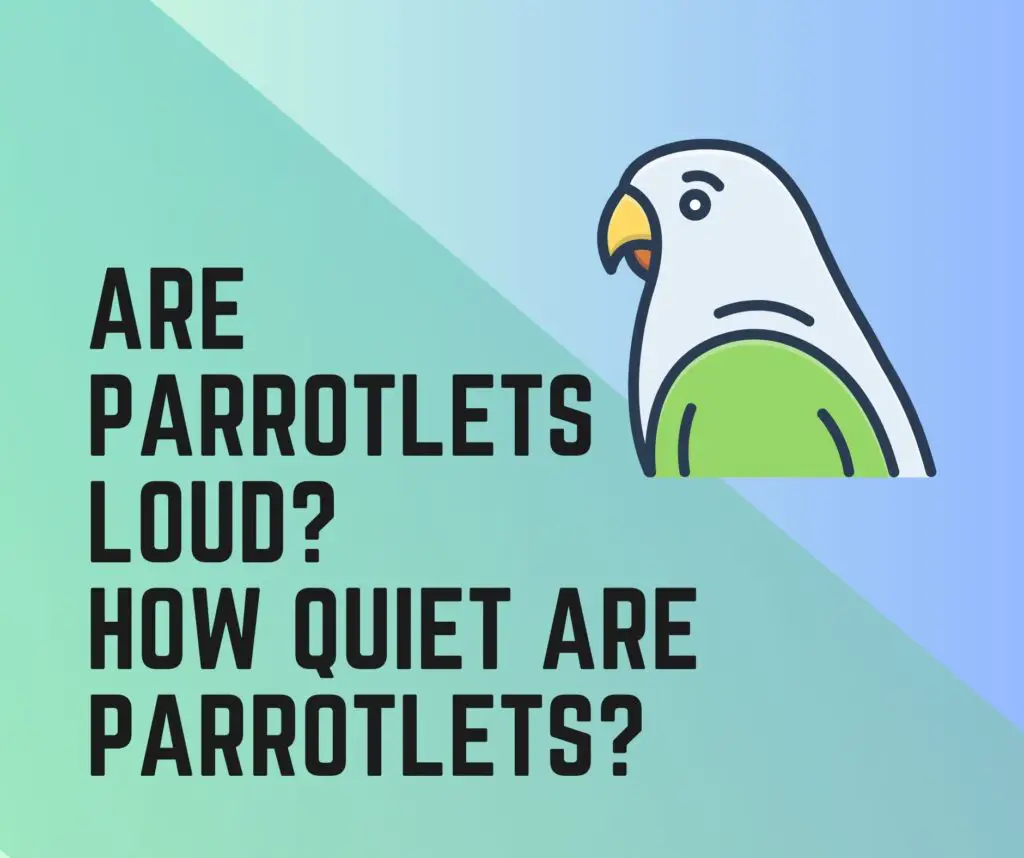Curious about Parrotlets and their noise levels? No more worries, as you are now in the right place.
The most beautiful thing about birds is their chirpiness. Birds, especially Parrots, love to chat, and there are fewer days when they remain quiet. From sunrise to sunset, parrots love making some or the other noises. However, that’s not the case with all of them. Parrots are loud, and they love chit-chatting, but Parrotlets, the smaller species, majorly love peace.
So aren’t Parrotlets loud? Come, let’s find out.
Join us in this article as we explore how noisy or loud Parrotlets can be. For their size, Parrotlets can be surprisingly noisy. Whether they are truly loud is still a question. While all parrots like to chat by making sounds with their syrinx, smaller parrots tend to keep it more hush-hush.
Continue reading to learn more.
Are Parrotlets Loud?
Well, there isn’t a definite Yes or No to this question.
Parrots are naturally loud, but when it comes to Parrotlets, they are on the quieter side, given their size. However, at the end of the day, Parrotlets are still Parrots, and they will make some noise. Parrotlets are known for singing and chirping throughout the day, but the noise is not thunderous. These tiny avians can get louder, especially if there are multiple of them in a room.
Parrotlets aren’t extremely loud, but they engage in back-and-forth chirping with others from the group. And when a lot of them start talking at once, it can become quite piercing at times.
However, Parrotlets are usually quiet when compared to budgies, cockatiels, and African grey parrots. According to experienced bird enthusiasts, keeping one Parrotlet in a room reduces noise levels and minimizes disturbances; however, increasing the number and the noise level will maximize. These birds aren’t whisper quiet, but they even do not cause frequent disturbances. As pets, they can be one of the peaceful choices amongst parrot lovers.
How Loud Are Parrotlets?
When we talk about Parrots, Parrotlets fall somewhere in the middle of the noise spectrum. Their average decibel level is around 65. According to calculation, Parrotlets are quieter than budgies (at 68 decibels) and notably less noisy than cockatiels (at 75 decibels). However, it is important to learn that Parrotlets can be louder to a few, including avian species like Red-Bellied Parrots, Senegal Parrots, Meyer’s Parrots, and Lovebirds.
Parrot keepers often claim that Parrotlets’ sound level can reach up to 90 decibels. It is similar to or near the sound produced by a jackhammer or a lawn mower at full throttle. According to this claim, Parrotlets can be quite noisy sometimes.
However, it is important to learn that the noise level amongst Parrotlets can vary from individual to individual. While some of them may have a loud personality, others may have a milder personality that adds to their quietness. Typically, most of the Parrotlets do not exceed the noise level of 80 decibels. It is at par with the traffic noise from 50 feet away.
No matter how loud or quiet Parrotlets can be, they are vocal, and that’s a fact. These intelligent avians are easy to train and thus make excellent companions. Despite whatever noises they make, an individual Parrotlet cannot get too loud. But if you have a lot of them, be ready to handle noises throughout the day.
How Quiet Are Parrotlets?
Parrotlets aren’t completely silent, but amongst Parrot species in general, they are relatively quiet. Their noise is similar to the one of traffic from nearly 50 feet away.
The average noise spectrum of Parrotlets falls between 65 to 80 decibels. They can be majorly on the quieter side but may even cross 90 decibels.
Overall, a Parrotlet may be quiet or bearable; however, Parrotlets, when they gather, aren’t really quiet.
Are Parrotlets Louder Than Budgies?
Both Parrotlets and Budgies are classified as quiet birds amongst the variety of avians. On average, the noise Parrotlets produce is around 65 decibels, whereas Budgies (or Parakeets) produce noise of around 68 decibels. The difference in their noise level isn’t much and relatively negligible, but Parrotlets are slightly quieter.
While comparing two birds and their noise level, it is crucial to understand that the perception of “Quiet” can differ for every individual. For some people, a quiet bird is one that doesn’t make noises at all. At the same time, some people may consider those birds to be quiet and doesn’t disrupt conversations in the next room.
If absolute silence is what you seek, none of the birds will qualify for the same. Every bird, to some degree, engages in vocalization. Amongst parrots, Parrotlets and Budgies are quite vocal, but due to their size, they aren’t the loudest. However, larger parrots like African Greys or Sun Conures are the ones noted as extremely noisier.
What adds to the noise level of Parrotlets is they are the most active. Whereas, since Budgies remains perched for long, they can be comparatively quieter. In addition to that, Parrots have stronger voices and larger vocal cords, which can make them louder than Budgies.
However, individual differences in noise levels can still vary. Overall, it’s not a strict rule that parrotlets are always louder than budgies.
Are Parrotlets Louder Than Cockatiels?
When compared to Cockatiels, Parrotlets are generally quieter. Parrotlets produce around 65 decibels of noise on average, while cockatiels are known to be noisier, with an average noise level of approximately 75 decibels.
Parrotlets Making Loud Noise- How To Handle?
If you have multiple Parrotlets as pets, we understand how noisy they can be. However, with noisy and loud Parrotlets, there’s a way to handle it. Follow these simple tips and tricks to manage their noise level.
- Firstly, if your Parrotlets have suddenly become so noisy, identify the cause and understand why. The reason may include fear, attention seeking or boredom. Some Parrotlets make noise due to their natural vocalization, though you may notice it in the first few days of adopting the bird.
- Being an intelligent bird, to stay content, Parrotlets needs mental stimulation. Engage them with activities or offer puzzles, toys, etc. The idea is to keep the bird occupied. Provide Mental Stimulation: Parrotlets are intelligent birds, so they need mental stimulation to stay content.
- Parrotlets are social birds and, thus, spend some quality time with them. If it’s their attention-seeking behaviour that’s leading to loud noises, give them the required attention. Interact with them through talking, training, or gentle play.
- If your pet Parrotlets are naturally loud, create a designated quiet area for their cage. The area should be away from any noisy appliances, high traffic, and frequent disturbances. Doing so will help in reducing the overall noise.
- Establish a regular daily routine for your Parrotlet. Doing so will ensure consistency, making them feel secure and reduce anxiety.
- Use positive reinforcement to reward your Parrotlet when they are quiet and well-behaved. Doing so will encourage them to stay quieter.
- If your pet Parrotlets are loud during the night or early morning, try covering their cage partially or fully. Doing so will promote a quieter sleep environment, reducing early morning noise.
- Whenever Parrotlets make a loud noise, DO NOT scold or punish them. Such behaviour can result in stress amongst the avians, worsening the problem.
- At last, if nothing works, consult a bird behaviourist for basic training. Or consult a veterinarian to rule out any health issues that may be causing discomfort.
Summary
Overall, Parrotlets can be loud and noisy as long as they are in a group. However, when alone, Parrotlets are generally quiet.
Also, remember that parrotlets are naturally vocal birds, and some noise is normal. If your pet Parrotlet makes some noise, you cannot make them completely quiet. Birds are known for vocalization, and it is a part of their natural behaviour. While addressing excessive noise, it is essential to strike a balance for Parrotlets’ natural behaviour.

Hi, There and Welcome to BirdsNews.com, is here to help you learn and care about pet birds. and this blog is a journal of everything I’ve learned.

